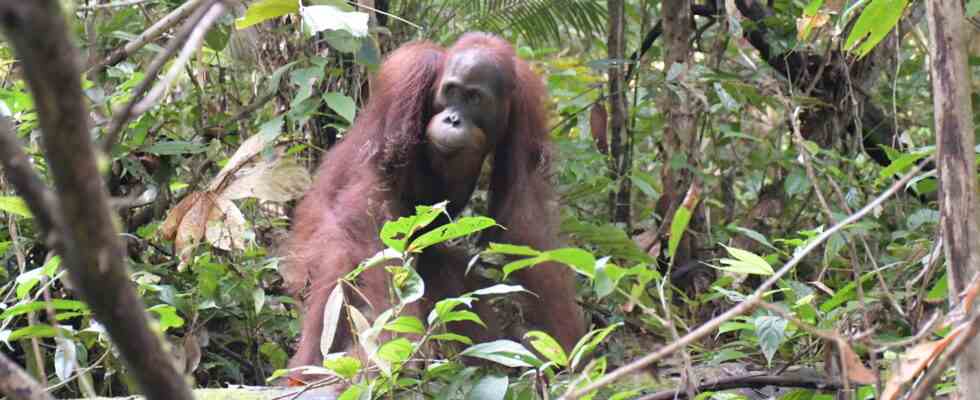Status: 28.11.2022 8:41 a.m
It is estimated that orangutans could be extinct in the wild in a few decades. The 500th great ape has now been released into the wild on Borneo – for twelve-year-old Ben, after a long period of preparation, a life in freedom begins.
Ben is twelve years old and, like many of his peers, had a difficult start in life. Now, after years of forest school, a new phase is beginning for the orangutan: a few days ago, he was released into the rainforest on Borneo together with his conspecifics Lima (13) and Gonzales (12). For the organization BOS (Borneo Orangutan Survival) it is a milestone in the fight for the survival of the great apes: Ben is the 500th orangutan to be released into the wild on the huge island.
The three teenagers are now romping through the Bukit Baka Bukit Raya National Park in Central Kalimantan, the Indonesian part of Borneo. “We must not forget that this solemn moment is just a milestone and not a mission completed,” said BOS General Manager Jamartin Sihite. “There are still hundreds of orangutans on pre-release islands, in the forest school and also behind cage bars, all waiting for the same chance.”
Today, the red-brown monkeys only live on the islands of Borneo and Sumatra. Palm oil plantations, poaching and forest fires are severely affecting the population. It is estimated that orangutans could be extinct in the wild in a few decades.
Ben’s first seconds of freedom – a small step for the orangutan, a milestone for animal rights activists.
Image: dpa
Kept as pets or abused for shows
The animals are often kept as pets from infancy on, sometimes under terrible conditions, or abused for shows in Southeast Asian amusement parks. After being rescued, they first have to laboriously learn how to climb trees, find food themselves or build a sleeping nest. Each release is the culmination of a year-long journey, Sihite said — from rescue to training to the moment the animals could be brought home to the jungle in jeeps and boats.
His mother Nanga also lives in the national park, which is now Ben’s home. The primate was rescued from an amusement park in Thailand in 2006. Four years later, she gave birth to Ben in the clinic of the BOS rehabilitation center Nyaru Menteng. Because of the long years in captivity, the mother was overwhelmed with the baby and could not breastfeed the little one properly. With a heavy heart, the team had to make the decision to separate mother and child to ensure Ben’s survival. Despite major initial problems, Nanga managed the rehabilitation and has been living in freedom in the national park since 2017.
Ben at the age of four in the playground of BOS rescue center Nyaru Menteng. After a long training in the forest kindergarten, the forest school and finally the BOS forest university, he is now where he really belongs: in the rainforest of Borneo.
Image: dpa
“We humans can, if we only want to”
Daniel Merdes, Managing Director of BOS Germany, described the 500th release as a “great realistic chance” to still get the endangered species. This proves “that we humans can, if we only want to”.
For Ben, Lima and Gonzales, the BOS pundits are optimistic about their future. All three are considered active and intelligent. After their release, they immediately began to roam, climb trees, forage and find food, and at dusk began to build their sleeping nest. Observation teams should keep an eye on the three young savages in the coming weeks – to make sure that they find their way around in their new habitat.

